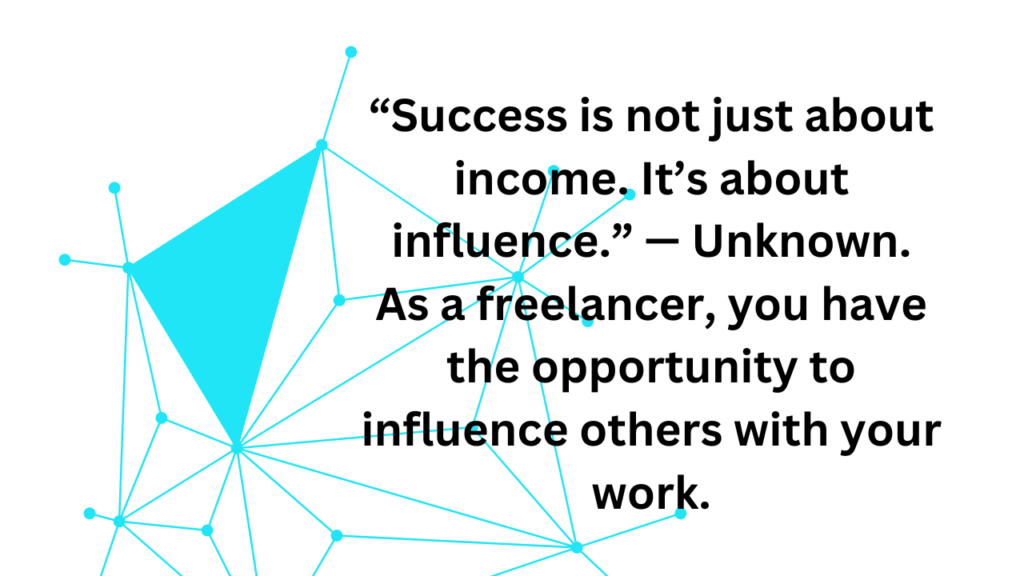Table of Contents
How to Become a Freelancer in 30 Days:

Are you tired of the traditional 9-5 grind and longing for the freedom of being your own boss. If that’s the case, working as a freelancer could be the ideal answer. In this blog “How to Become a Freelancer in 30 Days” we’ll guide you through the process of launching your freelance career in 30 days. Start by helping you identify your unique skills and strengths, essential for carving out a niche in the competitive freelance market.
Next, we’ll explore effective strategies for finding and attracting clients, from leveraging online platforms to networking within your industry. Additionally, we’ll provide practical advice on how to manage your finances as a freelancer, including setting up a separate bank account and tracking your expenses and income.
By the end of this blog, you’ll have a clear roadmap to kickstart your freelance journey and embark on a fulfilling career path that offers flexibility, autonomy, and unlimited potential for growth. So, if you’re ready to break free from the constraints of the traditional work model and pursue your passion on your own terms, read on to learn how to become a successful freelancer in 30 days.
Section 1: Assess Your Skills and Interests (Day 1-5): Be a Freelancer in 30 Days
Self-Reflection: Understanding Your Strengths and Passions
Start by delving deep into your inner self. Reflect on your strengths, weaknesses, and genuine passions. This self-awareness forms the bedrock of your freelance journey, guiding your career choices and shaping your professional identity. Recognize the skills you excel in and the areas where you can improve. Embrace your passions and align them with potential freelance opportunities. By understanding yourself fully, you lay a solid foundation for building a fulfilling and successful freelance career.

Identify Your Marketable Skills
Take the time to research different freelance niches to see which ones align best with your skills and interests. Look for areas where there’s a high demand for services and relatively low competition.
Research In-Demand Freelance Niches
Take the time to research different freelance niches to see which ones align best with your skills and interests. Look for areas where there’s a high demand for services and relatively low competition.
Choose Your Freelance Path: Writing, Designing, Coding, etc.
Based on your self-reflection and research, narrow down your options and choose a specific freelance path to focus on. This could be writing, graphic design, web development, or any other niche where you feel you can excel.
You may also like: How to Message a Teacher on WhatsApp
Section 2: Assess Your Skills and Interests (Day 5-10)
Create a Professional Portfolio
Gather samples of your work and create a professional portfolio to showcase your skills and expertise to potential clients. Ensure that your portfolio is aesthetically pleasing and well-structured.
Set Up Your Online Presence: Website and Social Media Profiles
Create a professional website to serve as your online hub. This will be where potential clients can learn more about you and your services. Additionally, set up profiles on social media platforms relevant to your industry to expand your reach.
Establish Your Brand Identity
Define your brand identity, including your unique value proposition, brand voice, and visual elements such as logos and color schemes. To have a powerful brand presence, consistency is essential.
Determine Your Pricing Strategy
Decide how much you’ll charge for your services and create a pricing structure that reflects your skills, experience, and the value you provide to clients. Consider factors such as industry standards, your target market, and the complexity of the project.
You may also like: How to Message a Teacher on WhatsApp
Section 3: Find Clients and Build Your Network (Day 11-20)
Utilize Freelance Platforms: Upwork, Freelancer, Fiverr, etc.
Sign up for freelance platforms where you can showcase your services and connect with clients. Create a compelling profile that highlights your skills and experience, and actively seek out relevant projects to bid on.
Networking Within Industry: Attend Seminars, Events & Join Online Communities
Networking is essential for freelancers. Attend industry events, join online forums and communities, and connect with fellow professionals in your niche. Developing connections can result in beneficial chances and recommendations.
Leverage Social Media for Marketing and Outreach
Use social media platforms like LinkedIn, Twitter, and Instagram to market your services and engage with potential clients. Share your work, provide valuable insights, and interact with your audience to build credibility and attract clients.
Offer Pro Bono Work or Discounts to Build Your Portfolio
In order to develop your portfolio and acquire experience, think about starting off by providing pro bono labor or discounts. This can help you attract your first clients and establish a reputation for delivering high-quality work.

Section 4: Manage Your Finances and Grow Your Business (Day 21-30)
Create a Different Bank Account Just for Your Freelance Earnings
Create a dedicated bank account for your freelancing revenue to keep your personal and professional finances apart. This will make it easier to track your earnings and expenses for tax purposes.
Track Your Expenses and Income
Keep detailed records of your business expenses and income to maintain financial stability and ensure you’re meeting your financial goals. Use accounting software or spreadsheets to track your finances efficiently.
Invest in Continuing Education and Skill Development
Continuously invest in your skills and knowledge to stay competitive in the ever-evolving freelance market. Take online courses, attend workshops, and seek out opportunities for professional development.
Scale Your Business: Hire Help or Expand Your Services
As your freelance business grows, explore ways to scale your operations. This could involve hiring subcontractors or employees to handle overflow work, expanding your range of services, or targeting new markets to increase your revenue.
Conclusion
Becoming a freelancer in 30 days is an ambitious goal, but with dedication, hard work, and the right strategies in place, it’s entirely achievable. By assessing your skills, setting up your infrastructure, finding clients, and managing your finances, you’ll be well on your way to building a successful freelance career.
- Define Niche and target market very clear.
- Build up yourself as a brand
- Find clients. Do networking.
- Manage your time & finances as time is money.
- Improve skills. Make your expertise
While having a specific skill set certainly helps, freelancing is open to individuals with a wide range of talents. Whether you’re a writer, designer, programmer, or consultant, there’s likely a market for your skills.
Start by evaluating your interests, strengths, and experiences. Think about your interest/ hobbies and areas of strength. Research the market demand for various skills and determine where your talents align with those needs.
Begin by creating a portfolio showcasing your work and skills. Set up profiles on freelance platforms like Upwork, Freelancer, or Fiverr. Network with professionals in your industry and market your services through social media and online forums.
Research the industry standards for your specific field and consider factors such as your level of experience, the complexity of the projects, and the value you provide to clients. Be sure to factor in all expenses, including taxes and overhead costs.
It’s important to register your business, obtain any necessary licenses or permits, and set up a separate bank account for your freelance income. Additionally, you’ll need to track your earnings and expenses for tax purposes.
Utilize your existing network by reaching out to friends, family, and former colleagues. Attend networking events, join online communities related to your industry, and actively seek out opportunities to pitch your services to potential clients.
Communication is key. Be clear and transparent about your services, pricing, and deadlines from the outset. Deliver high-quality work on time, and be responsive to client feedback and requests for revisions.
Never stop learning. Invest in your skills through courses, workshops, and professional development opportunities. Stay updated on industry trends and technologies, and continuously seek feedback to improve your services.
Avoid overcommitting yourself or underpricing your services. Be wary of clients who exhibit red flags, such as unrealistic expectations or a history of non-payment. Prioritize your mental and physical well-being, and remember that it’s okay to say no to projects that aren’t the right fit.
FAQs (Frequently Asked Questions)
Q1: Can anyone become a freelancer?
Absolutely, Freelancing is open to anyone with marketable skills and the determination to succeed.
Q2: How much can I expect to earn as a freelancer?
Earning potential varies depending on factors like your niche, experience, and client base, but many freelancers earn a comfortable income.
Q3: Do I need to have a college degree to become a freelancer?
A degree is not a must, although it can be helpful. it’s not a strict requirement. Many successful freelancers have gained experience through self-learning or alternative education paths.
Q4: How do I deal with difficult clients?
Communication is key. Set clear expectations from the beginning, and don’t hesitate to address any issues or concerns that arise during the project.
Q5: Is freelancing stable in the long term?
Freelancing can be unpredictable, but with proper planning and diversification of income streams, you can create stability in your freelance career.

